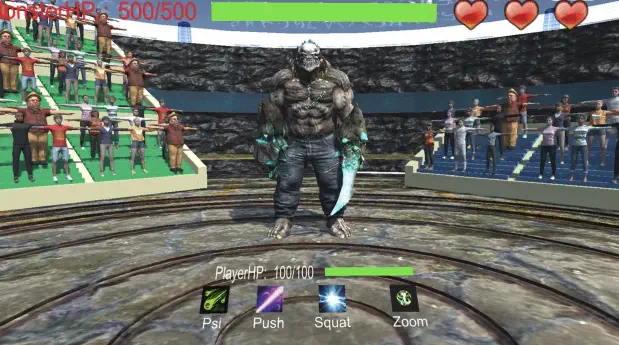Cheer for me (Virtual Reality)

In the past few decades, the population of older adults has been increasing rapidly because of better living conditions and much more advanced healthcare provision. Issues related to an aging population are rapidly gaining the attention of governments and healthcare providers worldwide. According to the United Nation’s World Population Prospects 2022 report (World Population Prospects 2022), the share of the global population aged 65 years or above is projected to rise from 10% in 2022 (i.e., 771 million) to 16% in 2050 (i.e., 1.6 billion). Physical functions of these users tend to gradually deteriorate with age and can lead to many challenges and health issues (e.g., limited mobility, muscle weakness, lower motor control) for the elderly (Larsen et al. 2013). The rapidly growing number of elderly who live longer but have health issues will put healthcare services and society in general under significant stress. However, previous studies (Taylor et al. 2004; Goldspink 2005; Mikus et al. 2011) stated that the most common reason for the loss of the physical function of the elderly is an unhealthy inactive lifestyle. Although regular exercise could improve their health, reduce the risk of many diseases, balance energy consumption and expenditure, and control weight gain (Warburton et al. 2006), many elderly still experience a lack of motivation to exercise. The situation has worsened with the COVID-19 pandemic since exercising in public outdoor or indoor places (e.g., gyms) for the elderly could involve a higher risk, than young adults (Guan et al. 2020; Lai et al. 2020), to be infected by the COVID-19 and experience significantly more symptoms, and even higher mortality (Guan et al. 2020; Chen et al. 2020). Thus, the space for exercising has been reduced, and this leads to a focus on individual and home-based activities, which can involve games.
Exergames have been used to address physical inactivity in the past decade because they could provide players with enjoyable and playful gameplay while at the same time exercising (Mellecker et al. 2013). Prior work has confirmed that elderly players can gain health benefits from playing exergames (e.g., improved quality of life (Konstantinidis et al. 2016), balance skills (Yang et al. 2020), and improved cognitive functions (Moreira et al. 2021); more can be found in Xu et al. (2020)).
Spectator audiences are always an important and integral part of public events, such as sports games. In such events, the presence of an audience and its feedback (or lack of it) could result in positive or negative effects on players’ performance. The social facilitation theories suggest that the presence of an audience can affect people’s performance and experience during an event (Aiello and Douthitt 2001; Bond and Titus 1983; Ducheneaut et al. 2006). Similarly, in videogames, virtual audiences, usually made of non-player characters (NPC), are often included in the gaming environment and can be considered an important gameplay element in sports videogames (e.g., NBA 2K,Footnote1 FIFAFootnote2). There is some research exploring the social facilitation effect of an NPC audience in virtual reality (VR) games (Bolton et al. 2014; Strojny et al. 2020). However, there has been little research investigating the effect of NPC audiences on players’ performance and experience in VR exergames. To our knowledge, there has been no prior research that has looked at the effect of audience and its feedback on elderly users playing VR exergames. This work aims to fill this gap and help find guidelines that can frame the design and engineering of such games for an increasingly more important population segment, older adults.
Rapid advances in immersive VR technology, especially in the form of inexpensive head-mounted displays (HMDs), have introduced new affordances and features to games that can improve immersion, gameplay experience, and enjoyment. For VR exergames, players can have additional gameplay capabilities and experiences that combined with an enhanced level of immersion make these games more interesting, enjoyable, and effective in promoting health outcomes (Xu et al. 2021, 2020, 2019) and can improve players’ intrinsic motivation to play such games (Xu et al. 2021). Prior research has confirmed that playing exergames in VR are more immersive and challenging than a 50-inch TV display (Xu et al. 2020) and can lead to better performance (Xu et al. 2021). In addition, playing exergames in VR can increase their motivation to do physical activities in general (Ioannou et al. 2019). These findings have been confined to younger players. For elderly players, while one recent paper has found that there is a general tendency for elderly users to accept VR exergames as part of their regular exercise regime (Xu et al. 2023), research linking VR exergames and older adult users are still largely underexplored. Much less is known about how these users will perceive an NPC audience ’watching’ them play a competitive exergame, and the feedback it provides based on their actions.
In short, this study aims to fill an unexplored space by investigating the effect of NPC audience feedback on the elderly’s performance and experience in VR exergames. More specifically, we want to investigate the following two Research Questions (RQ):
- RQ1: How would the presence of an NPC audience without reactive feedback (i.e., non-reactive to the player’s performance) affect older adult users’ performance and experience in VR exergames?
- RQ2: How would the presence of an NPC audience with reactive feedback affect older adult users’ performance and experience in VR exergames?
To answer these two questions, we run an experiment with 20 older adult participants who played a VR exergame under three conditions (no audience, audience with no feedback, and audience with reactive feedback). Our results show that an audience without feedback has no significant effect, but an audience with positive feedback can lead to improved performance and a better gameplay experience. These results can form the basis to frame the design and engineering of VR exergames that are tailored for older adult users.